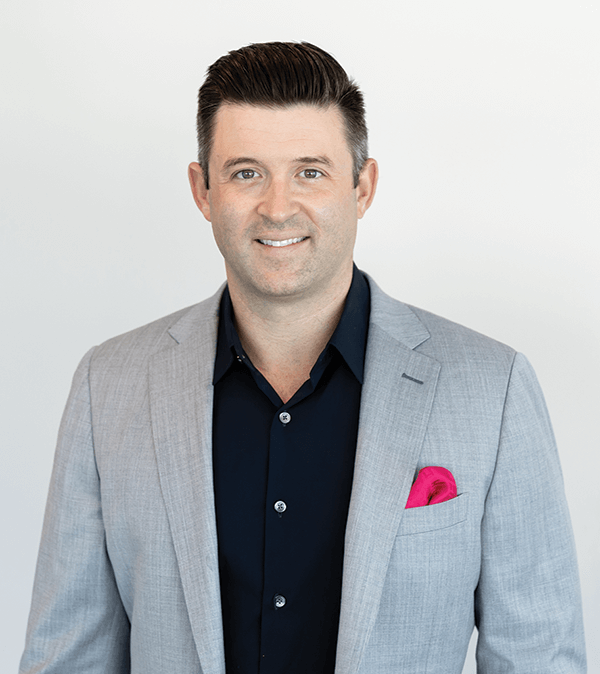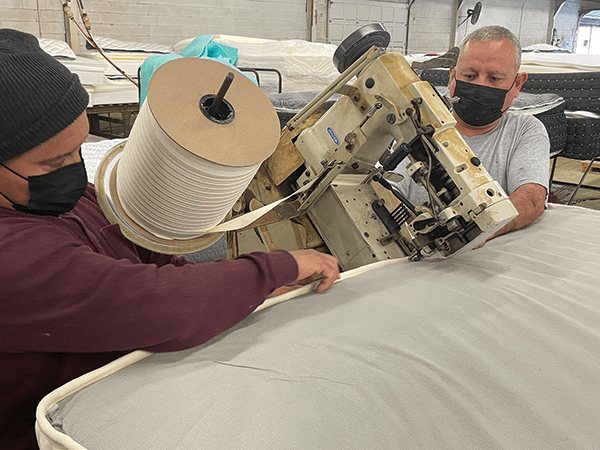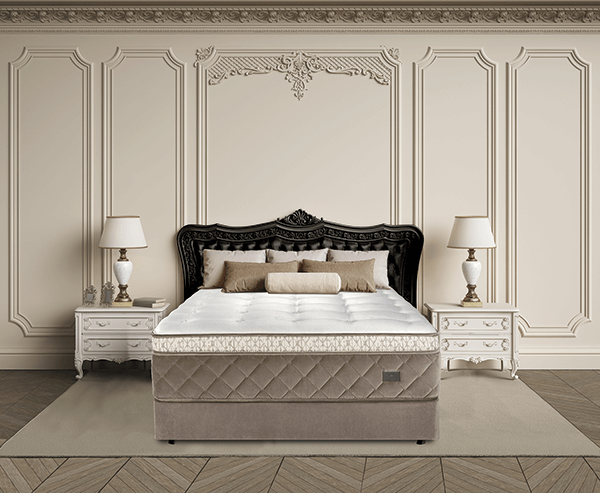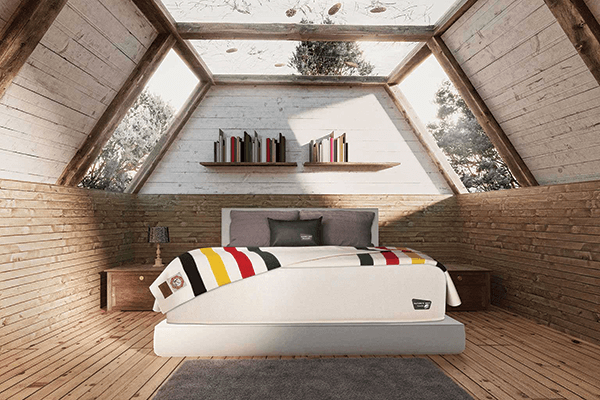The far-reaching licensing group focuses on best practices for manufacturers and retailers.

When Nick Bates joined licensing group Spring Air International as president in 2018, he knew he wanted to make big changes. The nearly century-old company based in the Boston suburb of Woburn, Massachusetts, worked with a host of facilities across the United States that worked independently of each other to produce its mattresses. But Bates thought a more streamlined network of integrated factories made more sense for the company.
Bates also wanted to bring together a group of licensees who were fully committed to Spring Air, for whom the business would be of great importance, not just one more brand in their portfolios. That required retaining some of the existing factories and excising others.
“We talked to a number of facilities and actually agreed for them to leave the brand,” he says. “And from there, we started to rebuild the company, asking, ‘Who do we want to work with, and who will be the right long-term partners?’ In studying the industry landscape, we asked, ‘Who will need us as much as we need them?’ ”
Those difficult conversations allowed Bates to create a nimbler, customer-focused operation that has grown both in the United States and abroad.
License to grow
“When I chose our 13 domestic factories, I was looking for independently owned facilities where they live and breathe their business, from the owner to the people who make the deliveries,” Bates says. “People who, when they walk me through their facility, intimately know what’s happening at every turn because they are there living it every single day. That was of huge importance to me, and the result is that we have created a group comprised of the brightest minds in the business. There is no outside equity money powering Spring Air — every facility is privately held. What makes it work is the people and their passion. We’re not weighed down by bureaucracy.”

In the United States, Spring Air licenses 13 independently owned factories in California, Colorado, Florida, Idaho, Illinois, Iowa, Massachusetts, Michigan, North Carolina, North Dakota, Pennsylvania, Tennessee and Texas. Internationally, Spring Air has factories in Canada, China, Dominican Republic, Egypt, France, India, Indonesia, Jamaica, Korea, Malaysia, Qatar, Saudi Arabia, Sri Lanka, Taiwan, Turkey, United Arab Emirates and Vietnam.
Managing and maintaining consistency across more than a dozen domestic factories may sound like a difficult task, but Bates sees it as an opportunity. The company hosts twice-a-year manufacturing summits at different factories, bringing together representatives from each facility to network and learn from one another.
“We come in and focus on a bed build, from start to finish,” Bates says. “We have watched handles being made, borders being quilted, top panels being cut, lamination processes — you name it, we did it.”
After the building demonstration, attendees from each factory gather to discuss best practices, answer questions and exchange ideas.
“You’ll hear a lot of, ‘At our facility, we do it this way,’ or someone saying, ‘That’s a much better way to do that — let me take a video,’ ” Bates says. “And that sharing is something you simply can’t buy in this industry.”
Spring Air also brings in outside marketing specialists, fabric vendors and other experts to add to the educational experience.
“The goal is to give these licensees the platform that they deserve and to help them build the script instead of us dictating down to them from the corporate office, saying, ‘This is what you’re going to do,’ ” Bates says.
Equipping retailers
Just as it does with its manufacturing licensees, Spring Air invests resources in its dealers to position them for success with the brand. And that commitment starts with educating the sales staff.
“No matter your volume, we’re going to give you a sales trainer,” Bates says. “That sales trainer will come in and make sure everybody in your store is comfortable with every aspect of our mattresses.”

And Bates says that with the company’s range of brands, retailers can find products that fit their target customers.
“You could open a store tomorrow using the Spring Air house of branded products and you’d have exactly what you need, soup to nuts,” he says.
But the biggest benefit for retailers, according to Bates, is Spring Air’s network of licensed domestic factories, which can give dealers an edge.
“Our national network really helps our retail partners with lead times,” he says. “It keeps costs down for our dealers, too, because they don’t have to bring in so much inventory and sit on five containers of six months’ worth of product. They can have (a few) weeks’ worth, and if they need more, they can get it quickly because our U.S. based factories are all easily accessible.”
Because those factories are owned by licensees carefully selected for their dedication and involvement in their facilities, they can provide dealers with the kind of service that makes the process of selling Spring Air products easier, as well.
“If you have a question, you’re going to get a live person right away,” Bates says. “One of our biggest priorities is providing personal assistance to our retailers. And then, of course, they can count on on-time delivery, quality products and all the stock necessary to support what we say we will do.”
To expand its dealer outreach, Spring Air has gotten more involved with retail buying groups. The company joined Furniture First four years ago, and it recently added Brand Source and Pacific Furniture Dealers to the mix. Even so, Bates is being very deliberate in his approach.

“We got invitations to join a few different buying groups, but we can’t say yes to all of them right now,” he says. “We wanted to get really good at serving each buying group we commit to before we add another, because I don’t want to let anyone fail or risk biting off more than we can chew.”
In the five years since coming into his role at Spring Air, Bates says he and his team have worked with a single goal in mind: to build the strongest licensing network possible to take the company to the next level with its retail partners.
“We’ve been hard at work building the strongest licensing organization in the nation, and in doing so, we have created a full range of product, domestic manufacturing that covers the entire country with the capacity necessary to support growing our dealer base even further, and we’ve done it while providing them service with a personal touch. Our end game is to continue to expand our footprint on their floors, and to keep innovating and driving new and exciting products to the industry while expanding our dealer base.”
A Storied Past and a Vibrant Present
Spring Air was founded in 1926 by Francis Karr, who just two years later developed a free-end offset coil design that adjusts to each sleeper’s weight. The revolutionary design took off, raising Spring Air’s profile.
During the 1940s, Spring Air introduced a button-free quilted design along with extra-supportive materials inside the mattress. In 1953, the company launched its Health Center mattress, featuring zones with targeted support for different areas of the body. Two decades later, in 1973, the company introduced its first pillow-top mattress.
In more recent years, Spring Air has evolved to encompass five key brands: Spring Air Back Supporter, Nature’s Rest, Reserve by Spring Air, Chattam & Wells and Four Seasons.
The Spring Air Back Supporter line offers hybrid beds featuring high-density, individually encased coils topped with high-density comfort foam and gel memory foam. The line also boasts a patent-pending, carbon-neutral, eco-friendly base. Back Supporter includes 13 models, ranging in price from $799 to $1,799. (All prices are suggested retails for queen-size mattresses only.)
Nature’s Rest is the company’s natural line, made with Talalay latex certified by the Eco Institute, along with biodegradable linen fabrics. Nature’s Rest mattresses come in five options: ultra-firm, firm, plush, firm euro-top and super-plush euro-top, ranging in price from $2,499 to $3,299.
Reserve by Spring Air offers a more luxe feel, with two layers of individually cased coils, layers of Talalay latex and Serene comfort foam, a layer of New Zealand wool and a Tencel antibacterial cooling cover. The affordable luxury line includes five handmade models, ranging in price from $1,699 to $3,099.
Spring Air’s premier luxury brand, Chattam & Wells, is handcrafted using the most sumptuous of materials. Tufted silken damask encases layers of cashmere, horsetail hair, Talalay latex, New Zealand-sourced Joma Wool, high-density foam, dual-layer comfort coils and encased coils. Chattam & Wells includes seven models in its premiere collection. The mattresses retail from $2,899 to $7,899. The brand also produces a line exclusive to Mattress Firm, with three models ranging in price from $5,999 to $7,999.
The company recently relaunched its Four Seasons bed with a 365-day climate solution and flippable design. One side features a cool-to-the-touch fabric cover, while the other boasts a wool-infused knit fabric. Inside, layers of Serene foam, Talalay latex and a three-zone, individually encased coil unit offer comfort and support. The Four Seasons line includes five models, ranging in price from $1,599 to $1,999.
“Our goal is to create a curated menu for our retailers to offer to customers,” Bates says. “And then we hyperfocus the branding on those menu items. We spend months creating specific attitudes and values for each of our key brands, creating a unique customer experience at each price point.”




